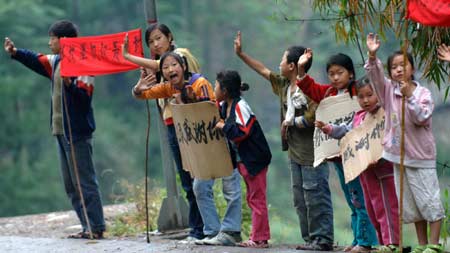Gov't spending slashed for quake relief
(China Daily/Xinhua/agencies)
Updated: 2008-05-22 06:46
Updated: 2008-05-22 06:46
About 45,000 medical workers are working in all quake-hit counties and townships in Sichuan, according to the Ministry of Health.
About 1,196 tons of disinfectants and bactericides were distributed, the ministry said in a statement.
 |
|
Children holding placards wave to the passing-by rescuers to express their gratitude beside the road linking the quake-devastated Qingchuan and Guangyuan of southwest China's Sichuan Province, May 21, 2008. [Xinhua] |
In seven out of the 11 worst-hit counties, sanitation work has been completed and in the other four, one-third of the townships have been covered.
According to local health departments, doctors found 58 cases of gas gangrene, a bacterial infection that produces gas within gangrenous tissues, as of Sunday.
But officials said the virus does not affect people without open wounds.
Meanwhile, rescuers are still fighting time to find survivors.
According to the Department of General Staff of the People's Liberation Army, rescuers saved and evacuated 396,811 people to safe places as of on Wednesday noon.
A total of 6,452 have been dug out alive from the rubble, with 77 rescued in the 36 hours to noon on Wednesday.
The Ministry of Health said that 3,424 people injured in the quake had died in hospitals.
Hospitals have taken in 59,394 injured people since the quake, of whom 30,289 were discharged, the ministry said.
Power has been restored in most parts of quake-hit areas but Beichuan County, one of the worst hit, remained blacked out and electricity in Hongyuan was cut off again due to aftershocks, the State Electricity Regulatory Commission said in a statement.
Experts on Wednesday said there was no need to worry that the 33 lakes in Sichuan - formed after landslides blocked rivers - would burst their banks.
"Generally speaking, those lakes are safe because the flood season is yet to come," said Liu Ning, general engineer of the Ministry of Water Resources.
"We are monitoring the lakes round the clock," he added.
|
||
|
||
|
|
|
|

